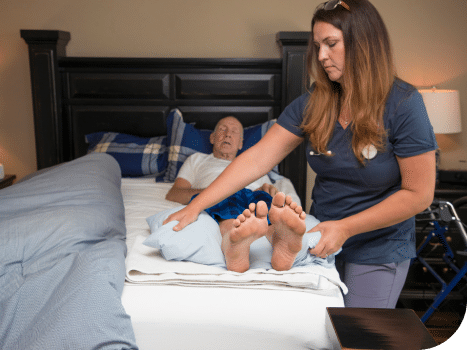Mesothelioma and Hospice Care
Hospice patients with mesothelioma enjoy the highest quality of life possible for as long as possible, with a focus on comfort rather than curative treatment. Patients and family caregivers experience greater satisfaction and reduced distress as the illness progresses, even during the final moments of life.
Home » National Mesothelioma Law Firm » Mesothelioma Cancer » Mesothelioma and Hospice Care
Mesothelioma symptoms, such as coughing, shortness of breath, and pain, can cause significant distress. Treatment side effects may add to this discomfort. Hospice care allows mesothelioma patients to live more comfortably during their final days.
According to BMJ Supportive and Palliative Care, patients who used hospice during the last six months of life achieved greater pain control, better outcomes, and higher satisfaction. They were also less likely to die in the hospital.
What is hospice care?
Hospice care is specialized care for people dying from a terminal illness, typically with an estimated life expectancy of six months or less. They have stopped seeking curative therapy and have instead chosen to allow their disease to run its natural course.
The primary focus of hospice care is comfort, and this directive extends beyond the relief of physical symptoms. Patients in hospice care receive whole-patient care, which includes interventions to increase mental, emotional, spiritual, and physical well-being.
The idea of specialized care for the dying was introduced in the United States during a 1963 lecture at Yale University by Dame Cicely Saunders, an English nurse, physician, social worker, and writer, according to NORC at the University of Chicago. She founded the first hospice in London in 1967, according to BMJ.
Hospice was groundbreaking because it offered a superior approach to end-of-life care, with dying patients experiencing the following benefits for the first time:
- Effective pain management
- Death with dignity, compassion, and respect
- Scientific testing for comfort treatments
- The ability to receive honest answers about a diagnosis
Why Hospice Care May Be a Good
Option for Mesothelioma Patients
Mesothelioma patients are often diagnosed after the disease has reached its later phases. Even with treatment, the life expectancy for mesothelioma is often less than a year. As the condition progresses, symptoms worsen, and mesothelioma treatment options are increasingly limited.
Comfort Measures
Patients who enroll in hospice receive specialized care that helps relieve their most distressing symptoms. The treatment team may not have focused on relieving these symptoms while the patient was undergoing care with a curative intent.
Shortness of Breath
Shortness of breath is a common symptom of mesothelioma, and it causes significant distress because it feels like suffocating. It is sometimes described as “air hunger.” While receiving hospice care, shortness of breath may be managed through the following means, according to The Journal of Clinical Oncology:
- A fan directed at the patient’s cheek
- Changes in posture
- Relaxation
- Meditation
- Supplemental oxygen
- Use of a non-invasive ventilator
- Medications
Medications for shortness of breath may include the following:
- Opioids to slow breathing
- Short-acting benzodiazepines to decrease anxiety
- Systemic corticosteroids to relieve inflammation obstructing the airway
- Bronchodilators to widen the airways
When the life expectancy is down to just a few days, and all other comfort measures have failed, hospice providers may offer to sedate the patient for relief. Sedation is only used if the patient consents.
Pain Managemen
Pain management for mesothelioma patients is complex because they tend to experience multiple types of pain. According to Lung Cancer: Targets and Therapy, patients with malignant mesothelioma experience each of the following types of pain at the same time:
- Nociceptive pain – Pain caused by damage to the body, such as when a tumor invades bodily tissues
- Neuropathic pain – Pain caused by damage to the nervous system, such as nerve compression or damage
This combination of different types of pain is difficult to treat. It can quickly become unbearable.
Adequate pain management is crucial to the quality of life, dignity, and enjoyment of the precious time left with loved ones. As a result, hospice patients with mesothelioma may be able to receive stronger medications, which may be more restricted in general health care settings.
According to Pharmacy Times, the most common medications terminal patients receive include the following:
- Acetaminophen
- Haloperidol
- Lorazepam
- Morphine
- Prochlorperazine
Pain management is most effective when a multi-modal approach is used, including a combination of opioids, non-opioid drugs, and alternative mesothelioma therapies such as biofeedback, acupuncture, and massage therapy.
Pain can be worsened by insomnia, depression, and anxiety. However, these conditions can be addressed with medication and other methodologies. Hospice’s nurturing environment and a whole-person approach to care can ease these symptoms for mesothelioma patients and make pain management more effective.
Hospice is About Living Rather Than Dying
While often associated with death, hospice is more about living than dying. According to Psychology Today, people receiving hospice care actually live longer than similar patients outside of hospice.
The principles guiding hospice care are about helping each patient live life to the fullest to the very end, making the most of every moment, spending time with family, and enjoying life as long as possible.
When death does come, hospice helps remove the pain and fear from the process and works to ensure it occurs in a manner consistent with the patient’s wishes and values.
Hospice Reduces Suffering
A study published in the Journal of Clinical Oncology showed that cancer patients who died in intensive care units and hospitals experienced more physical and emotional distress and a worsened quality end of life compared to those who died at home while receiving hospice care.
Additionally, family members and caregivers of patients who died in an ICU or hospital were more likely to develop post-traumatic stress disorder and prolonged grief disorders than the family members of those who died in hospice.
Hospice Services Continue After Death
Hospice services are also provided to family members, including bereavement support, such as grief counseling, following the patient’s death. Hospice providers often offer these services for as long as a year after the death.
Where is hospice care provided?
Hospice care is most often provided at home, but it can be offered wherever the home may be, including nursing homes, assisted living facilities, and even hospitals. Receiving hospice care at home allows patients to see friends and family without restrictions. Home hospice care also spares patients from traveling to doctor appointments.
Inpatient Hospice Care Centers
Inpatient hospice providers offer care in the hospital, benefitting patients who lack family support, wish to avoid nursing homes, and require 24-hour care. Inpatient hospice care still offers benefits for patients who cannot leave the hospital. While it is not the same as living in your own home, a dignified, comfortable quality of life is still prioritized.

When should I seek hospice care for mesothelioma?
If you are relying on Medicare to pay for hospice care, you are generally required to have an estimated life expectancy of six months or less.
Even if you have already received the required prognosis, the decision to stop pursuing treatment and transfer to hospice care is highly personal. It is important to make this decision on your own timetable. People often pursue hospice care when they have reached the following conclusions:
- Potentially curative or life-extending treatment options have been exhausted.
- Treatment impairs quality of life without sufficiently increasing life span.
- Quality of life has become more important than quantity.
- Pursuing treatment is cutting into quality time with loved ones.
Many mesothelioma patients seeking hospice care have made peace with their diagnosis and simply want to enjoy life as long as possible. However, some patients may not arrive at this point until after entering hospice care.
What to Expect in Hospice Care
When you enroll in hospice, you can expect a multidisciplinary team to manage your care based on your needs. Your team may include the following:
- A medical director or hospice physician
- Nurses
- A social worker
- Mental health counselors
- Spiritual counselors
- Nurse practitioners
- Physician assistants
The social worker will meet with you periodically to discuss your needs and gain important information to coordinate your care. Supplemental oxygen, medications, and other equipment will be delivered to your door or the facility where you receive care.
Your hospice health care providers will provide care on a schedule that works best for you and your loved ones. If you need 24-hour care or supervision, it must be arranged separately. However, if you do not have people who can help, your social worker may be able to help you find the care you need.
Hospice also provides short-term in-home personal care—known as respite care—to provide family caregivers with a break.
Paying for Hospice Care
To obtain Medicare coverage for hospice care, you must waive all treatment with curative intent. Although Medicare covers hospice care, it does not cover inpatient room and board while receiving hospice care.
Medicaid offers similar coverage for hospice care as Medicare, but coverage varies by state. Some state Medicaid programs may not cover hospice care. Private insurers also cover hospice care, but coverage varies between providers and different states. You may also pay privately if you have the resources to do so.

How can The Lanier Law Firm help?
If you have developed this type of cancer, our mesothelioma law firm may be able to help you find financial compensation to help pay for treatment and provide for your family. We also may be able to refer you to mesothelioma support resources in your area. Contact us today for a free consultation.
By submitting this form, you agree to our terms & conditions. Please read the full disclaimer



